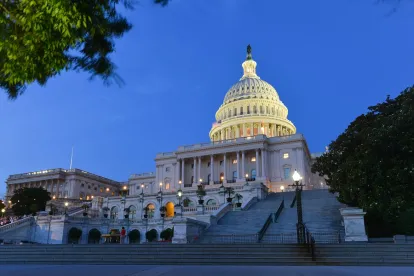Congress: Always in Crisis Mode
The U.S. Congress returned this week for a three-week sprint to the end of the legislative year. With so much on its plate, it is quite possible that Congress will be working up to and around both Christmas and New Year’s Eve. Here is what Congress has been contending with and what it will face in the next few weeks.
-
Shutdown averted. With less than 36 hours left before funding to keep the federal government open expired, Congress approved R. 6119, the “Further Extending Government Funding Act,” to keep the government running through February 18, 2022. President Joe Biden signed the short-term funding legislation into law today, December 3, 2021. This means that at the start of 2022 the federal government will continue to operate under spending limits determined during the Trump administration.
-
Military spending. Spending authorization for the U.S. Armed Forces will expire at the end of the calendar year, if Congress does not act. The annual National Defense Authorization Act, which establishes spending levels for defense programs, has continuously passed every year since it was introduced in 1961. This defense budget bill will be a congressional priority and will take up legislative time.
-
Debt limit. Remember the October 2021 political battle over the federal government’s borrowing limit? Well, because Congress merely kicked the can down the road, we are quickly approaching the deadline for addressing the borrowing limit. Treasury Secretary Janet Yellen has notified Congress that the United States’ borrowing limit will be reached on December 15, 2021, unless Congress acts.
-
Build Back Better Act. Senate Democrats are hoping to come to an agreement on their version of the $1.75 trillion reconciliation package that the U.S. House of Representatives passed on November 19, 2021. On the table is a new federal paid leave program, as well as increased and new civil penalties for employer violations of various federal labor and employment laws.
Federal Vaccine Mandate Update
Legal challenges to various federal vaccine requirements have had success.
-
OSHA ETS. There is no ruling yet from the Sixth Circuit Court of Appeals on the consolidated challenges to the Occupational Safety and Health Administration’s (OSHA) COVID-19 Vaccination and Testing Emergency Temporary Standard (ETS). The court will entertain briefing on whether to lift the Fifth Circuit Court of Appeals’ stay of the ETS through December 10, 2021, meaning that the stay is likely to remain in place until at least that date. Further, OSHA extended the deadline for the public to submit comments in response to the ETS has been extended from December 6, 2021, to January 19, 2022. The U.S. Department of Labor (DOL) stated that the purpose of the comment deadline extension is “to allow stakeholders additional time to review the ETS and collect information and data necessary for comment.” As of this writing, nearly 94,000 comments on the ETS have already been filed.
-
CMS requirements. The Centers for Medicare and Medicaid Services’ (CMS) interim final rule requiring vaccination of employees working in facilities receiving Medicare or Medicaid funding has been enjoined nationwide pursuant to a court order issued by the U.S. District Court for the Western District of Louisiana.
-
Federal contractor requirements. On November 30, 2021, a federal district court in Kentucky enjoined the implementation of Executive Order 14042, which requires some federal contractors and subcontractors to comply with COVID-19 workplace safety protocols issued by the Safer Federal Workforce Task Force. The preliminary injunction prevents the executive order from taking effect in Kentucky, Ohio, and Tennessee.
OFCCP to Require AAP Verification
On December 2, 2021, the Office of Federal Contract Compliance Programs (OFCCP) finalized its Affirmative Action Program Verification Interface (referred to as the “Contractor Portal”). The initiative got its start during the Trump administration, and it will require covered federal contractors, through submission via an online portal, “to certify, on an annual basis, whether they have developed and maintained an affirmative action program for each establishment and/or functional unit, as applicable.” The following are key implementation and compliance dates:
-
February 1, 2022: Registration opens for access to the portal.
-
March 31, 2022: Employers may begin submitting certifications of their affirmative action plans.
-
June 30, 2022: “[E]xisting contractors must certify whether they have developed and maintained an affirmative action program for each establishment and/or functional unit, as applicable,” by this deadline.
Belva Lockwood, Pioneer
November 30, 2021, marked the 141st anniversary of the first time a female attorney argued before the Supreme Court of the United States. Belva Lockwood was a Washington, D.C., attorney and an early pioneer in the struggle for women’s rights. In 1879, she successfully lobbied Congress to pass the “Lockwood Bill,” which permitted female attorneys to practice law in any federal court. One year later, Lockwood made history when she argued Kaiser v. Stickney (1880) before the Court, a case that concerned a $16,000 debt owed by Lockwood’s client, Caroline Kaiser. Lockwood presented arguments before the Court again in United States v. Cherokee Nation (1906), a landmark case in which she argued that her client, the Cherokee Nation, was owed payment by the U.S. government pursuant to an 1835 treaty. Lockwood lost Kaiser, won Cherokee Nation, and was a key figure in the advancement of civil rights.




 />i
/>i

